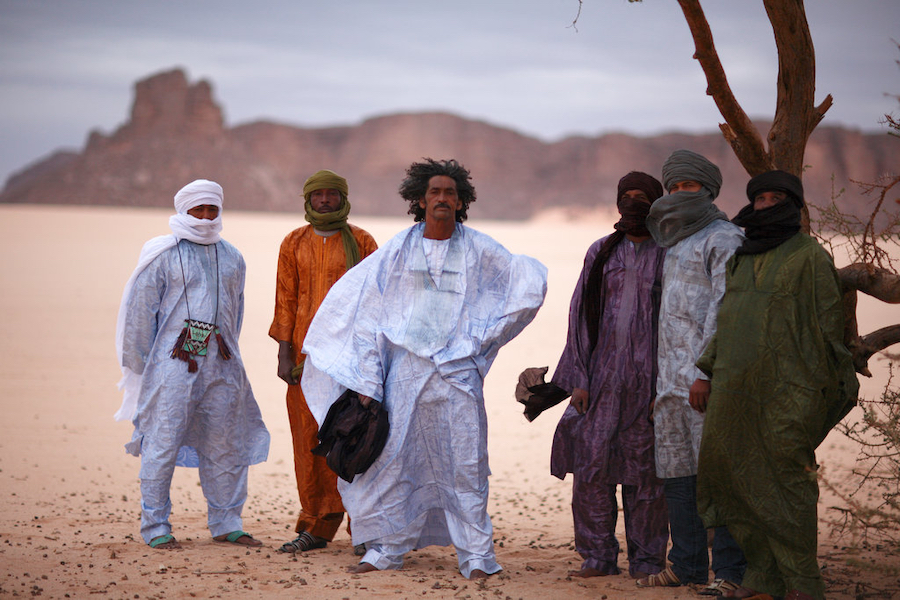
Malian Musicians Have Been Muzzled
On December 1, 2012, Secretary Hillary Clinton honored eight performing artists at the State Department, stating, “Art is an outward expression of our common human dignity…they [artists] refused to accept the world as it is or the limitations that someone or society tried to place on them. They insist on exploring what could be, they challenge our prejudices, and change our perspectives.”
The following night, at the 35th Kennedy Center Honors event, Dustin Hoffman, Natalia Makarova, David Letterman George “Buddy” Guy and Led Zeppelin (Robert Plant, Jimmy Page, and John Paul Jones) were inducted as this year’s honorees. Our family has attended the prestigious event for the past twenty years. Having survived the Holocaust, and achieved the American Dream, I related to the challenges several of the artists had to overcome to find success. The eight honorees all have made a difference in the world—as performing artists.
The Kennedy Center Opera House was packed with over 2,000 luminaries and politicians; government, business and community leaders; honoree family and friends; media moguls and performers, and a cross-section of civil society. There we were, shoulder-to-shoulder, gathered to honor these great artists–who came from humble beginnings–one tracing his roots back to Africa, and another escaping from the Soviet Union. All endeavored to achieve–freedom of expression—excellence in their art form.
Dustin Hoffman, Natalia Makarova, and David Letterman were lauded for their numerous accomplishments. However, it was the music of Buddy Guy and Led Zeppelin that brought the audience to their feet, clapping and singing along with the performers on the stage. It seemed like everyone had some recall to an earlier time in their lives, growing up with the music of these talented artists. Both have inspired a new generation of musicians, who tonight were performing on-stage in their honor. Peace was in the air, even among the different political factions.
Music throughout history has represented the art-form of story-telling—a language that has transcended time. Blues music, often tells stories of the destitute– the poor–and social and political wrongs. “The blues is about hard times….” noted Buddy Guy, in an interview with the Washington Post.
Although Guy struggled for years, as one of the most talented guitarists of his time, as noted by his peers, success came later in life–at age fifty. Morgan Freeman, a friend, noted that Buddy Guy was a pioneer “who helped bridge soul and rock and roll.” Proclaiming, “When you hear the blues, you really don’t think of it as black or white or yellow or purple or blue…your blue brought us together.”
Caught up in Buddy Guy’s music, I reflected on the December 1, 2012 Washington Post article “Islamists silence northern Mali’s music tradition,” that noted, “Hundreds of artists have fled [northern Mali] fearing wrath of hard-liners.” Mali has a long music tradition, foremost in serving to record history, to unit communities and cultures–and to entertain. The article noted that freedom of expression through music, expresses one’s strife, but also one’s happiness. In most cases music has led to a peaceful environment.
Robert Plant performed at Timbuktu’s “Festival of the Desert” in 2003. In an interview with NPR’s Renee Montagne, his “fascination with the blues goes back to his early days as lead singer for Led Zeppelin. The roots of that uniquely American art form may be traced to the deserts of Western Africa.” He noted that slaves from Mali “could have been a link to the blues that later emerged in the Mississippi Delta.”
In November 30, 2012, Washington Post article “In northern Mali, music silenced as Islamists drive out artists,” an Islamist leader of the Movement for Oneness and Jihad in West Africa (MOJWA), active in northern Mali, stated “Music is against Islam. Instead of singing, why don’t they read the Koran? Why don’t they subject themselves to God and pray? We are not only against the musicians in Mali, but we are also in a struggle against all the musicians of the world.”
The radical Islamists, that took control of towns and villages in northern Mali, have gone door-to-door destroying musical instruments, and music playing devices such as cassette players. The playing of music brought whip lashes and in some cases prison time. Any singing came with the threat of having their tongues cut out. The article noted, northern Mali “one of the richest reservoirs of music on the continent, is now an artistic wasteland.” Most of the musicians from the region have fled to the capital, Bamako, while others have gone to neighboring Niger and Burkina Faso.
On November 15, Yeah Samake the mayor of Ouelessebougou introduced me to Mamadou Diabate, the 2009 Grammy Award winner for the “Best Traditional World Music,” for his solo album ‘Douga Mansa.’ Mamadou came from a family of musicians in Mali, that have used music to preserve the Manika language, and people’s consciousness of the past, dating back to the 13th century. Born in Kita, a Malian town long known as a center for art and culture, Mamadou’s father taught him, at age six, to play the ‘kora’ (the 21-string harp). Over dinner, Mamadou told me he was saddened by the thought of what the Islamists were doing to destroy Mali’s long-standing history of music culture.
In Libya after the fall of Muammar Gaddafi, large amounts of weapons reached the embedded Islamists in northern Mali. Outgunned the Malian military withdrew, which gave control to several Islamist groups. Two UN Security Council Resolutions have been passed to deal with the Islamists, allowing the regional Economic Community of West African States (ECOWAS) and African Union (AU) military to intervene in northern Mali, to subdue these extremists. However, to date, the formal approval to go forward has been withheld.
Since the United States espouses freedom and democracy, it needs to focus on Mali, where Al-Qaeda in the Islamic Maghreb (AQIM), MOJWA and Ansar Dine Islamists are in control of a region the size of France. The U.S. needs to address the growing danger that these Islamists pose to the entire Sahel region. The U.S. supported quick action in North Africa for regime change. In reality, we aided the extremist Islamist movement in North Africa and Sahel. Our aim was to institute democratic governance. In doing so we destabilized Mali, a fledgling democracy, and several Sahel countries.
On October 12, 2012 Youssoufou Bamba the Côte d’ Ivoire representative to the United Nations stated, “The clock is ticking and every day that passes brings more suffering to the population trapped in the areas controlled by the terrorists” noting, they were carrying out all kinds of criminal activities in northern Mali, “Inaction is no longer an option.” Reuters noted on November 16, “Any foreign-backed offensive to retake control of northern Mali from al-Qaeda-linked Islamists will take at least six months to prepare, a delay that runs counter to the expectations of many Malians.” Immediate action also has not been supported by Secretary Clinton to Mali’s dismay.
Meanwhile, atrocities against the Malian people continue. Over 500,000 Malians have fled the country. Islamists have destroyed 13th-century artifacts, libraries, and mausoleums. They have severely damaged a World Heritage site, the 15th century Sidi Yahya mosque in Timbuktu. And as we were honoring great legendary artists on December 2, 2012, Islamists were destroying the rich, artistic music culture in Mali, dating back to the 13th century.

